Key takeaways
- Family health is about creating nurturing habits that encompass balanced nutrition, physical activity, and emotional well-being.
- Consistent, enjoyable rituals like family walks and meal planning foster healthier lifestyles and strengthen family bonds.
- Open communication about feelings and shared family activities help manage stress and encourage emotional health.
- Proactive approaches to preventive healthcare, like regular check-ups, promote a sense of control and encourage health ownership among family members.
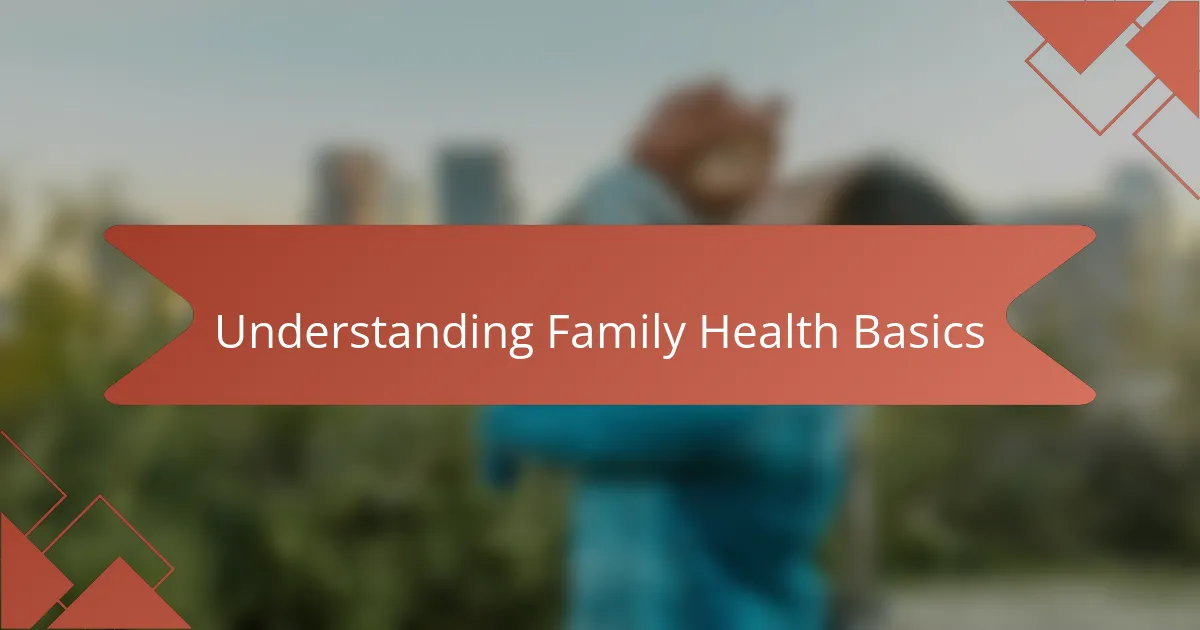
Understanding Family Health Basics
When I first started paying attention to family health basics, I realized it’s more than just avoiding sickness—it’s about creating habits that nurture both body and mind. Have you ever wondered why some families seem effortlessly healthy? To me, it comes down to understanding the simple foundations like balanced nutrition, regular physical activity, and emotional well-being.
I remember feeling overwhelmed at the beginning, trying to figure out where to start, but focusing on clear, manageable steps made all the difference. For example, ensuring everyone got enough sleep wasn’t just a rule; it became a kind way to respect each other’s needs and recharge together. It made me appreciate how these small basics build a strong foundation that supports every other aspect of life.
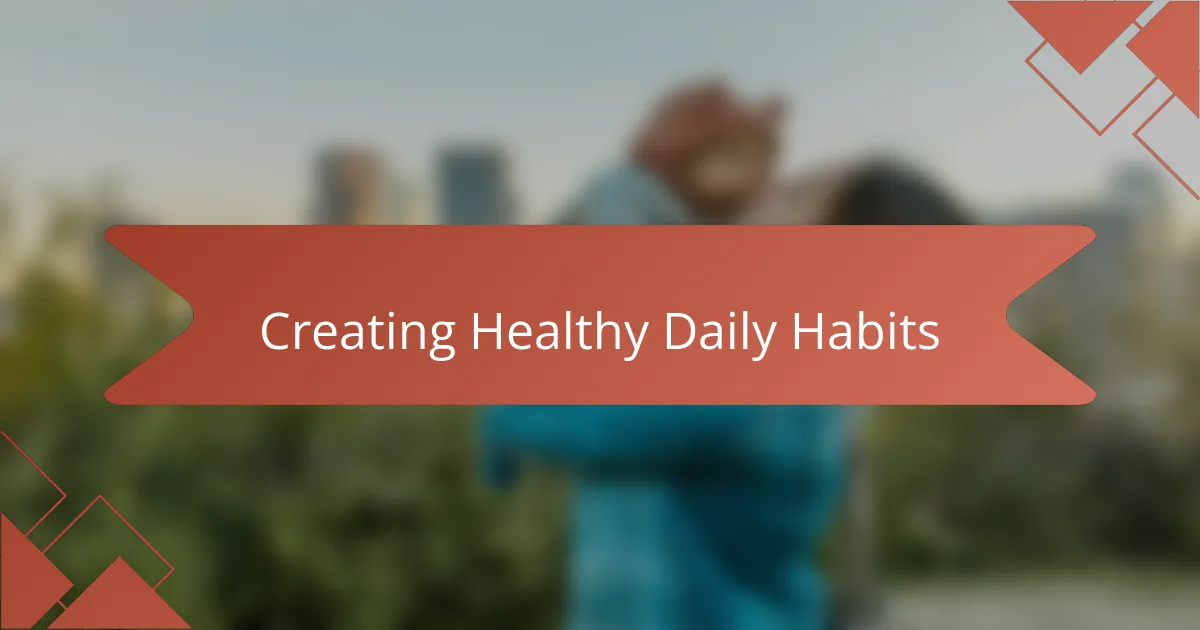
Creating Healthy Daily Habits
Building healthy daily habits felt like a puzzle at first, but I found that consistency was the key piece. Have you noticed how little changes, like family walks after dinner or taking turns choosing a vegetable at the grocery store, slowly shape a healthier routine? These simple actions didn’t just improve our diet or activity levels—they created moments to connect and support each other.
Some days were harder than others. I recall mornings when convincing everyone to eat a wholesome breakfast seemed impossible, yet over time, it became a natural part of our rhythm. That gradual shift taught me patience and how resilience in habits leads to lasting family wellness.
What truly made these habits stick was turning them into enjoyable rituals, not chores. We celebrated small wins, like a week of no sugary drinks or trying a new sport together, which motivated us to keep going. I’ve learned that when healthy habits feel good, they become part of who we are.
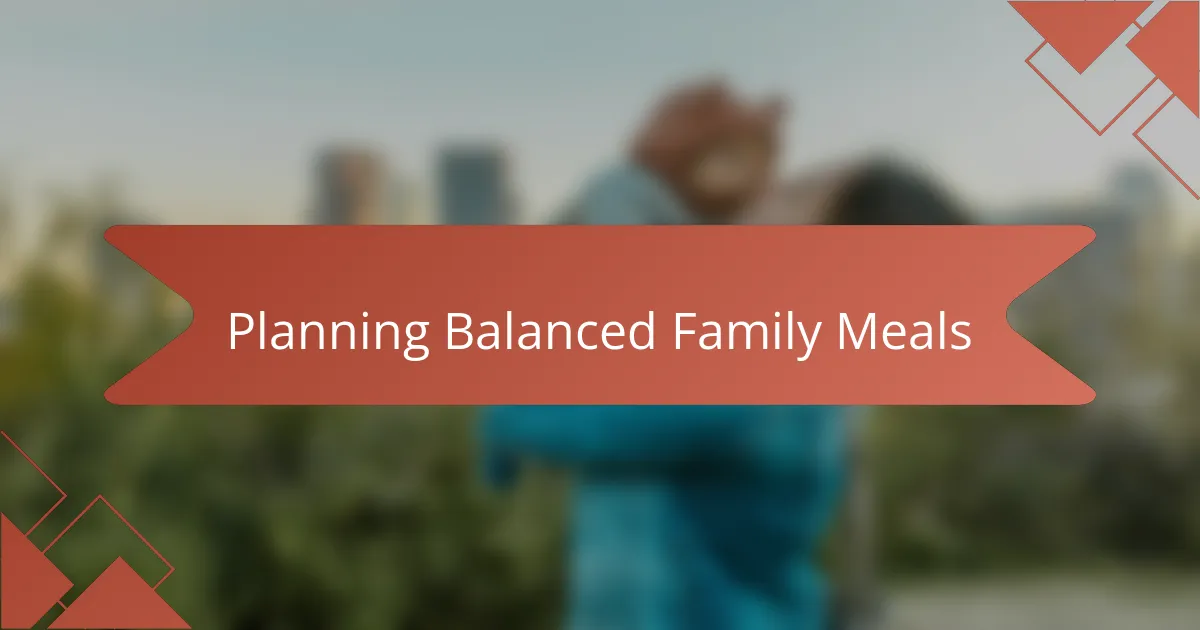
Planning Balanced Family Meals
Planning balanced family meals was a game-changer for us. Have you ever found yourself staring blankly at the fridge, unsure how to put together something both nutritious and appealing? I used to feel that way all the time, but setting aside a little time each week to plan our meals took the guesswork out of it and reduced stress at dinner time.
I started thinking about meals as a colorful plate—a mix of proteins, veggies, whole grains, and healthy fats. It wasn’t about strict rules; it was about variety and balance. I noticed how my kids began to try new foods when meals were visually inviting and tasted good, which made me both proud and relieved.
Sometimes, I’d involve the whole family in the planning process, turning it into a fun discussion rather than a chore. Asking questions like “What vegetable should we try this week?” or “What’s your favorite healthy dinner?” made everyone feel included, and the meals became something we all looked forward to sharing. This simple shift created a stronger connection around the dinner table, beyond just the food.
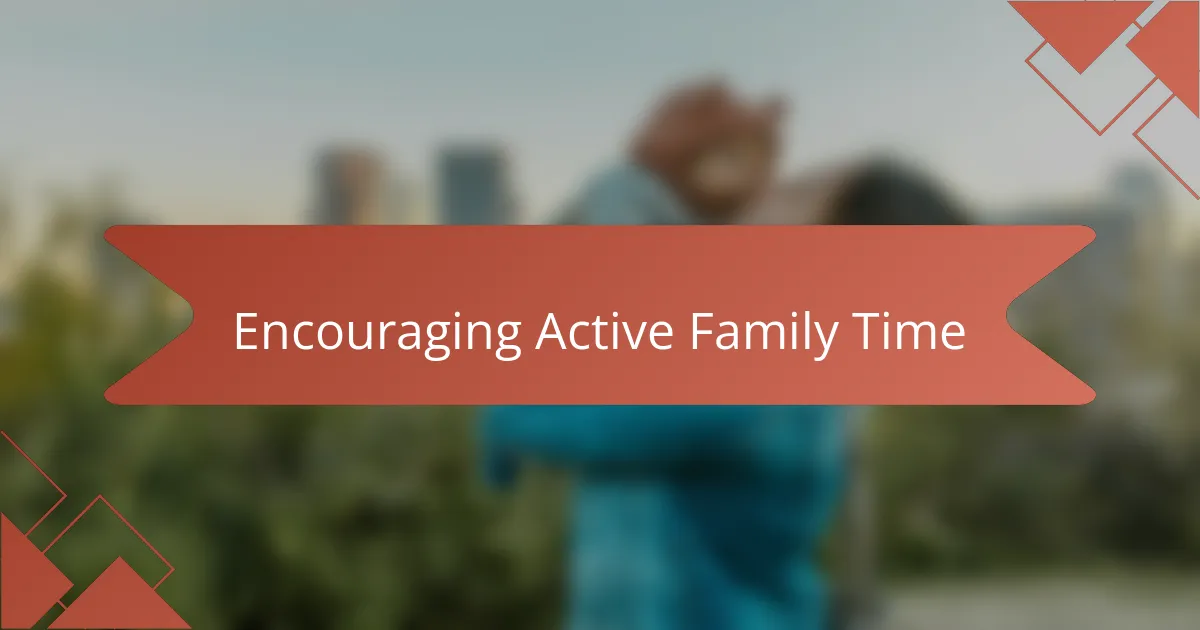
Encouraging Active Family Time
Encouraging active family time was one of the best decisions we made. I found that turning off screens and suggesting a simple game of tag or a walk around the neighborhood sparked laughter and movement, even on the busiest days. Have you noticed how little bursts of fun activity can brighten everyone’s mood and energy?
At first, it wasn’t easy to get everyone motivated, especially when kids preferred their devices. But I started setting aside Sunday afternoons as “family adventure time,” where we’d explore a park or try a new sport together. Those moments became some of my favorites—not just for the exercise but for the memories and connection they created.
What surprised me most was how these activities naturally encouraged my family to be more active throughout the week. Once we experienced the joy of moving together, it wasn’t about forcing exercise anymore—it was about choosing fun and feeling good as a unit. That shift made all the difference in keeping us healthy and close.
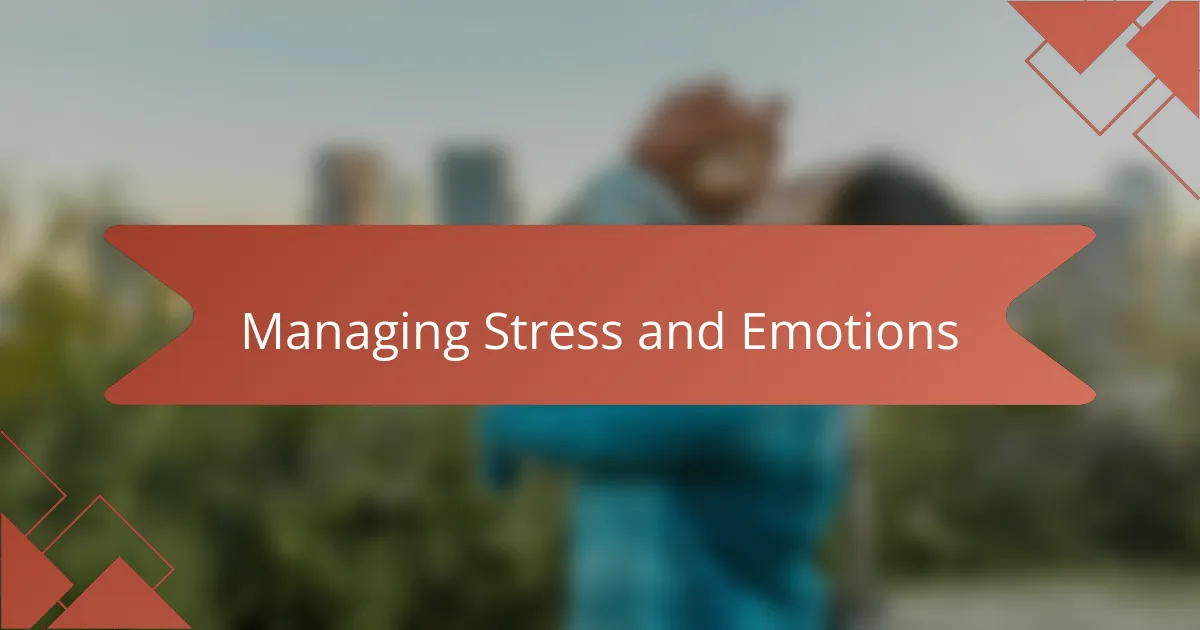
Managing Stress and Emotions
Managing stress and emotions felt like navigating a maze at times. I noticed that when tension built up, even small disagreements could escalate quickly. So, I made it a point to create a space where everyone felt safe sharing their feelings—whether through a quick chat or just a reassuring hug.
Have you ever asked your family how their day really went, and then actually listened? I found that simple question opened doors to understanding and eased worries that might otherwise have bottled up inside. These moments helped me see that managing stress isn’t about fixing problems instantly, but about being present and supportive.
Sometimes, I introduced calm-down techniques like deep breathing or short meditation breaks, especially when emotions ran high. At first, it felt a bit awkward, but seeing my kids and partner relax made me realize these small pauses were powerful tools. They reminded me that taking care of our emotional health is just as important as anything else we do to stay healthy.

Maintaining Preventive Healthcare
One thing I realized early on about preventive healthcare is that it’s all about staying one step ahead. Have you ever thought about how regular check-ups, vaccinations, and screenings act like a safety net? For my family, scheduling these visits became a shared commitment, not an afterthought, which helped catch small issues before they turned into bigger problems.
I admit, it wasn’t always easy to keep track of everyone’s appointments amid daily chaos. But creating a simple calendar reminder system transformed how we approached prevention—making it less daunting and more of a routine part of life. Knowing we were proactive gave me a real sense of control and peace about our health.
Sometimes, I also used preventive care as a chance to teach my kids about their bodies and why these steps matter. Asking them, “Do you know why we visit the doctor even when we feel fine?” sparked curious conversations and helped them take ownership of their health early on. Engaging them this way made preventive healthcare a natural habit rather than a chore.
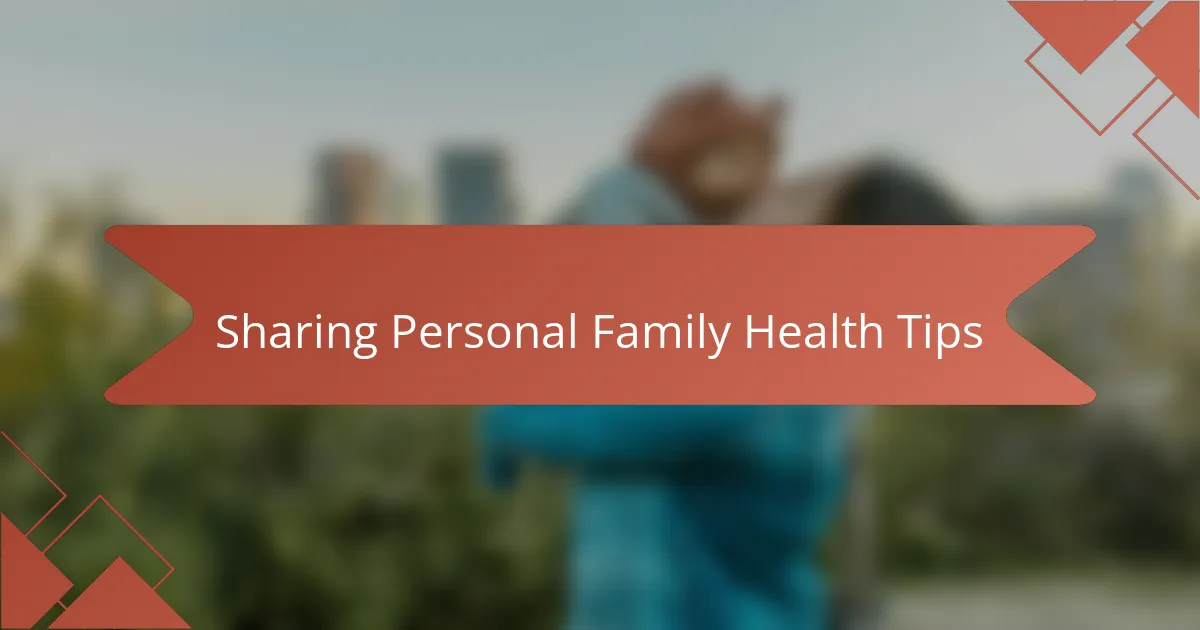
Sharing Personal Family Health Tips
Sharing personal family health tips often feels like passing down a precious legacy. I’ve found that openly talking about what works—and what doesn’t—creates a supportive atmosphere where everyone feels heard and motivated. Have you ever noticed how a simple suggestion from one family member can gently inspire others to try something new for their well-being?
One tip that stuck with us was making hydration fun by adding natural flavors to water, like cucumber or berries, instead of sugary drinks. It was a small change, but seeing the kids excited to drink more water made me realize how little tweaks can lead to big improvements. Sometimes, these everyday moments are where true health transformations begin.
I also think the way we frame health conversations matters a lot. Instead of focusing on restrictions or rules, I try to share my experiences with a positive spin—highlighting the benefits we’ve felt, like more energy or better moods. Does this approach make you think differently about how you’d talk about health in your own family? From my experience, positivity truly encourages lasting change.